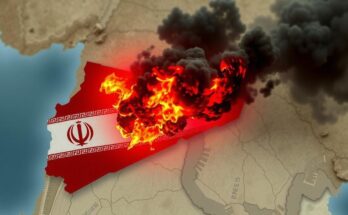A Human Rights Watch report warns that Sudanese refugees in Ethiopia are facing significant threats due to growing violence in the Amhara region. Documented abuses, including violence, abduction, and forced labor, have increased since April 2023 amid conflict between Ethiopian forces and local militias. Protests for better conditions have been met with police force, and refugees continue to endure dire circumstances, exacerbated by forced relocations and inadequate governmental protection.
A recent report by Human Rights Watch (HRW) has highlighted the grave risks faced by Sudanese refugees in Ethiopia’s Amhara region amid ongoing violence and societal tensions. Since April 2023, these refugees, who fled Sudan’s brutal conflict, have been subjected to numerous abuses including violence, abduction, forced labor, and theft. Laetitia Bader, HRW’s deputy Africa director, emphasized the urgent need for protection for these vulnerable individuals who have already endured horrific experiences in their homeland. The situation in the Amhara region has deteriorated significantly, particularly following a surge of conflict in August 2023 between Ethiopian government forces and local militias known as Fano. This violence poses a direct threat to refugees residing in camps in the region, leading to heightened insecurity. Reports of looting, beatings, and murders have been documented by refugees, revealing a perilous existence. The precarious security situation forced the Sudanese government to close the El Gedaref border crossing on September 5, 2023, further trapping refugees in Ethiopia. Many flooded into Awlala and Kumer camps, where they have continued to face threats from armed groups, with one refugee recounting an incident where gunmen demanded money and shot into their tent. Protests erupted in August 2023, driven by frustration over inadequate food and medical services, with refugees demanding protection from militias. The situation further escalated in April 2024 when over a thousand refugees attempted to march toward the UNHCR office in Gonder to protest against the lack of security but were met with police resistance and violence. The report details instances of forced labor, where refugees were coerced into working on local farms under threat of violence. Furthermore, endemic violence culminated in a deadly attack on the Kumer camp in July 2024, which left Ethiopian police officers dead and refugees exposed to danger. In a desperate attempt to find safety, refugees were sometimes forcibly relocated. The management of their relocation was criticized by refugees, who recount being beaten by security forces and forcibly separated from family members. While Ethiopian officials deny any allegations of abuse or forced relocation, HRW has urged the Ethiopian government to uphold its responsibility to protect refugees. Despite the challenges, Ethiopia has taken in over 90,000 Sudanese refugees since the onset of conflict in Sudan and continues to face immense pressure to provide adequate safety and resources. The HRW report asserts the need for improved protections and conditions for these vulnerable populations, shining a light on the dire consequences stemming from regional conflicts.
The humanitarian crisis surrounding Sudanese refugees in Ethiopia is compounded by ongoing conflicts within Ethiopia itself and the spillover effects from Sudan’s civil war. Since April 2023, increasing violence in Sudan has led to mass displacement, forcing thousands to cross into Ethiopia. Refugees from Sudan are particularly susceptible to regional tensions among local communities, and their precarious status as asylum seekers exacerbates their vulnerability to violence and exploitation in host countries. The Amhara region has seen rising tensions, notably between ethnic groups, which have resulted in an unsafe environment for refugees who fled violence in their own countries. Human Rights Watch’s findings call attention to the urgent need for international and domestic efforts to protect these vulnerable populations and ensure their basic human rights are upheld.
In summary, the findings of Human Rights Watch paint a chilling picture of the dangers facing Sudanese refugees in Ethiopia’s Amhara region. These individuals, who have survived significant trauma already, now find themselves targeted in a context of escalating violence and insecurity. Immediate measures are required to safeguard their well-being, address their urgent humanitarian needs, and ensure their safety against armed groups. The report underscores Ethiopia’s responsibility as a host country to protect refugees, reaffirming the need for global advocacy to hold governments accountable in their obligations towards displaced populations. The international community must also recognize and respond to the challenges these refugees face as they seek safety and support.
Original Source: www.dabangasudan.org




